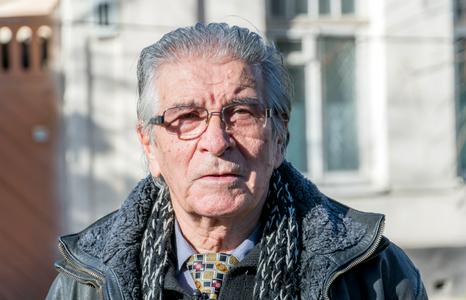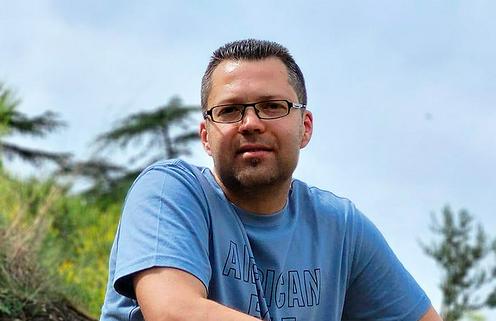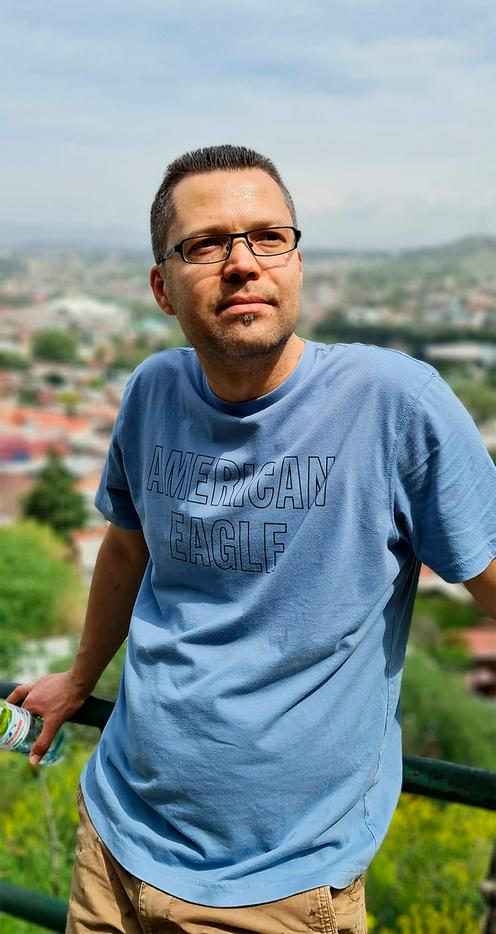In Soviet times, censorship was a routine part of life. But with Gorbachev’s perestroika and the collapse of the Soviet Union, everything changed. Freedom of speech became one of the defining ideas of the late 1980s and early 1990s.
Yet before long, some post-Soviet republics began to roll back those gains, and censorship started to reclaim lost ground. Nowhere was this more apparent than in Turkmenistan.
Ruslan Myatiev, founder and editor-in-chief of the website turkmen.news, discusses the past and present of censorship in the country.
A Burst Pipe Under Wise Leadership
— In our republic, as throughout the USSR, the era of glasnost began with perestroika. Suddenly, it became possible to say and write things that had previously been unthinkable. My parents were journalists, and in the late 1980s, they could freely raise sensitive issues.
Of course, local officials would often express their displeasure afterward. But the articles were still published, investigations would follow, those responsible would be punished, and problems would be fixed.
Unfortunately, the golden age of Turkmen independent journalism didn’t last long. I think the real decline in freedom of speech began in the mid-1990s, when President Niyazov was given the title ‘Turkmenbashi.’
After that, even mild criticism on everyday topics stopped appearing—both in national and local press. That’s when self-censorship took hold.”
— There’s a view that the turning point came with the case of Natalya Sosnina, a journalist at Turkmenskaya Iskra. She had been investigating corruption at the highest levels of government—and then suddenly disappeared without a trace. That was in April 1993. They say the story shook the entire journalistic community: some people left the profession, some left the country, and others fell into deep self-censorship.
— Yes, probably. That was a clear signal that the glasnost era was over and the era of Turkmenbashi had begun. His cult rose with astonishing speed. Officials, artists, and many others all contributed to it. To some extent, the push to glorify Niyazov was also picked up by the public. He was almost deified. After the 2002 assassination attempt, people began calling him a prophet outright. Naturally, in such an atmosphere, criticism was unthinkable.”
— Well, that’s understandable when it comes to Turkmenbashi himself. But what if someone criticized local officials? Or say, a water pipe burst — surely it was okay to write about that?
— No, it wasn’t. Most officials were personally appointed by Niyazov. If you criticized them, you were essentially questioning the soundness of his personnel decisions. He himself could tear apart an official he had appointed — but only he could do that. Ministers or hyakims (regional and city governors) were appointed with a six-month probation period. After six months, they might stay on — or go straight to prison.
And as for everyday life, even something like a burst pipe couldn’t be written about. The media endlessly reported that everything was going great, everything was on the rise. Every year, the harvest of cotton or wheat increased — at least on paper. You could write that roses were blooming in the garden, but not that a pipe had burst somewhere. Because what would that imply? That under the wise leadership of the great Turkmenbashi, a pipe burst? Impossible!
— Were there any actual laws under Niyazov that allowed journalists to be punished for trying to speak out? Or were they jailed and pushed out of the country without any legal basis?
— The Law on Mass Media was developed later, under Gurbanguly Berdymukhamedov. Under Niyazov, it was the law of the jungle. If they said you couldn’t do something, then you couldn’t. Those who didn’t want to accept that left the country. This also affected national minorities. In the 1990s, there was a wave of mass emigration from Turkmenistan. People left for Russia, unable to make sense of the new order. The civil war in Tajikistan also scared many. We, thank God, didn’t experience anything so destructive. Yes, there were ethnic tensions, and sometimes people were told, ‘Go back to your homeland—in Russia.’ But it didn’t come to civil war. Still, realizing they could no longer live under such conditions, people left — including journalists.
— How did the remaining independent journalists in the country operate under the new circumstances?
— In the late ’90s and early 2000s, there were attempts to publish independent news bulletins. My parents were among those involved. One of the journalists in that circle was Farid Tukhbatullin, who now heads the Turkmen Initiative for Human Rights. Then came the so-called assassination attempt on Niyazov. That gave the security services a pretext to shut down all independent journalistic activity. Andrei Zatoka was expelled from Turkmenistan, Farid Tukhbatullin was imprisoned, and eventually, our family left the country too.
— People tend to think that the internet only came to Turkmenistan under Gurbanguly Berdymukhamedov.
— That’s not actually true. It became widespread under Berdymukhamedov, but it first appeared under Niyazov. I lived in the small northern city of Dashoguz, and even back then there were several internet cafés. Of course, there were no social media platforms like we have now. But even so, it was possible to find information online. Under Berdymukhamedov, state-run internet cafés were introduced. Maybe for the first year or two they worked, but eventually the security apparatus crushed them. Little by little, they began blocking unwanted websites, platforms, entire types of content. Those cafés still exist, but they’re basically useless now.
Today, people get internet access at home. But we have only one provider — the state has a monopoly on internet service. More than half of websites are inaccessible. Savvy users either rely on VPNs or buy routers with VPN preinstalled. The most absurd part? The same people selling these VPNs are the ones providing — and blocking — the internet. The agency is called the Cybersecurity Directorate of Turkmenistan.
Cyber-Demons on the Hunt
Even for private users, internet access in Turkmenistan comes at a steep price. Here are the current rates from TurkmenTelecom: 1 Mbps costs 150 manats per month ($45), 2 Mbps is 180 manats ($54), 4 Mbps goes for 230 manats ($68), and 6 Mbps will set you back 280 manats ($83). Meanwhile, the average monthly salary in the country is around 1,500 manats ($450). That means even the slowest, most basic plan eats up ten percent of a person’s income. And that’s not for full internet access—it’s a heavily censored network where most websites are blocked.
These restrictions are officially justified in the name of national security, protecting citizens from extremist content or pornography. But Ruslan Myatiev believes this is just rhetoric. When a user buys a VPN or an open internet connection—so-called “white lists”—all websites become accessible. In reality, the internet shutdown is no longer about national security; it’s pure business. In plain terms, Turkmenistan’s Cybersecurity Directorate blocks the internet only to sell unfiltered access to it later.
So-called “white lists” cost users anywhere from $1,500 to $2,000 per month. VPN keys distributed by private individuals are much cheaper. However, these private sellers are actively targeted by the very same Cybersecurity Directorate. What’s more, the agency now blocks not just individual websites, but entire subnets—tens of thousands of sites at once. Under such conditions, VPNs are becoming increasingly ineffective.
Those who need fast and reliable internet—whether major companies or simply wealthy individuals—are left with no choice but to pay for “white list” access, shelling out as much as $2,000 a month for the privilege.
— All right, say I need fast, unrestricted internet. How do I buy one of these “white lists”? Who do I go to? What does it look like, technically and logistically?
— For example, there’s a popular news agency in Turkmenistan called Turkmenportal. Inside the country, their website isn’t blocked, but they’re very active on social media. They have a large Instagram account (banned in Russia and owned by Meta, which is designated as extremist in the Russian Federation – Fergana’s note), post short videos on TikTok, share news on Russian platforms like VKontakte, and so on. All of those platforms are officially blocked in Turkmenistan, meaning they should be inaccessible. And yet Turkmenportal, like other outlets, continues to use them all. So the question is: how are they accessing these sites if they’re banned? The answer is that they have a $2,000 monthly subscription and a dedicated internet line they use. That line has no filters. I live in Europe and can visit any website I like — and so can they, only it costs them a fortune.
Another example: there’s the Yyldyz Hotel in Ashgabat, where foreign guests and visiting delegations usually stay. The hotel has two internet lines. One is standard and available to all Turkmen users — almost everything is blocked on it. The second, however, has no filters whatsoever. At reception, foreigners are given the password for the unrestricted Wi-Fi line. This creates the illusion that there’s no internet censorship in Turkmenistan. But of course, that’s far from true. The hotel pays for that dedicated line — and pays the same people who are responsible for blocking the internet in the first place. Naturally, none of this is done openly. It goes through a chain of dealers — one dealer, then another, then another, and so on.
But what about ordinary people — can they access the open internet? Yes, they can, but only by circumventing the law. In Turkmenistan, just about any mobile phone seller at a local market will install a VPN for a fee. That’s also a dealer. But there are two kinds of dealers in Turkmenistan. The first are private individuals — people who’ve rented a server somewhere, built their own VPN on it, and sell access keys as a way to make money. The second category are the so-called cyber devils — officials who hunt down the first group. “Cyber devils” is what people call employees of the Cybersecurity Directorate. Why are they going after private dealers? Because they’re competition. Both groups are doing the same thing: selling access to the open internet. The difference is that the cyber devils have official authority and power. Nothing is blocked for them. And when they give you access via a “white list,” they also get to see everything you do — what sites you visit, what you’re sending, who you’re sending it to, and what you’re writing.
— Okay, so VPN keys from private dealers are pretty straightforward — you can just walk up to a mobile phone seller at the market and get one through them or one of their contacts. But what if I’m, say, an organization and want to buy one of these $2,000 “white lists”? Who do I turn to?
— You see, Turkmenistan is a small country, and Ashgabat is even smaller. People who work in telecom — whether it’s at Turkmentelecom or the city’s phone network — they all know each other. All it takes is finding one person. They’ll either connect you directly with a seller or point you to another IT or telecom specialist who, sooner or later, will lead you to the right contact.
— And this person — would they be an official from the Cybersecurity Directorate?
— They might be a government official, a regular engineer, or some other kind of specialist. But whoever it is, they’ll set you up with everything you need — in exchange for the same $2,000. Most of that money, of course, goes up the chain to their superiors, but they get a cut too. It’s like a pyramid scheme: bring in ten clients and earn your reward.
The most outrageous part of all this is that the leadership of the Cybersecurity Directorate is appointed by the president. And, of course, the highest levels of government are fully aware of what’s going on. So the question is: why aren’t they doing anything about it? After all, the cyber devils’ business clearly goes against the law and the country’s stated policies. In my view, there are two possible explanations. Either the president is unable to change the situation, or he’s somehow benefiting from it. Maybe it serves his interests. Maybe it serves his father, Gurbanguly Berdimuhamedow. Or maybe Gurbanguly is simply telling his son, “Don’t touch this. Officials are our foundation — they need to feed themselves.” And so they do.
The other possibility is that President Serdar Berdimuhamedow simply doesn’t have enough political power. Turkmenistan is currently in an active phase of dual rule: the father — the former president and now chairman of the upper house of parliament — and the son, the sitting president. And for now, the father still holds more power, more authority, and more influence in the country than his son, even if the son technically holds the higher office.
— Could people in Turkmenistan now be prosecuted for online activities, say, for likes and reposts? Have there been such cases, and have people actually received real prison terms?
— That happened before, but under Serdar (the current president), things have eased a bit. For example, some of our informants got caught, but they weren’t prosecuted—they were just warned, told that next time the consequences would be more serious. Under Gurbanguly (the former president), though, people were sentenced for such things—and these cases are well known. For instance, someone wrote poems about the coronavirus and the hardships of life, and they got five years for that.
My correspondent, Nurgeldy Khalykov, was sentenced to four years on a fabricated charge under the previous president. His life was ruined, his health destroyed. That was in 2020. Now it’s a bit easier in that respect. On the other hand, corruption has worsened. Nowadays, people openly say: “Bring this much, and you’ll get that much.” They name the amount directly — a bundle or half a bundle, meaning $5,000 or $10,000.
Neither imprison nor kill
— In my opinion, the current president of Turkmenistan is different from his father, — continues Ruslan Myatiev. — Although the same methods are being applied to him as to his predecessors. The same people who once praised Niyazov and Gurbanguly Berdymukhammedov are now trying to build a cult of personality around Serdar as well. But while it worked with the father, it’s not working with the son yet. They try to declare him a sultan, put a crown on him, but Serdar hasn’t bought into it so far. He hasn’t lost his mind. He doesn’t do the kinds of things his father did — all those joyrides, horses, racing cars, shootings, and so on. He behaves seriously, you could even say modestly. You won’t believe it, but he only wears black ties. I saw him in a brown tie only once and thought: wow, Serdar changed his tie! Otherwise, he wears a black formal suit, black tie, white shirt. None of those sultan-like extravagances of his father. You could never see Gurbanguly wearing the same outfit twice. His wardrobe was constantly renewed — every day a new outfit.
— Do you think that with the weakening of his father’s power, Serdar might allow some loosening, maybe even reforms?
— It’s a complicated question. I don’t think his father’s power will weaken. But it may happen that this power simply ends, because after all, everyone is mortal. But if the younger Berdymukhammedov remains literally the sole ruler in the country, everything will depend on his ability to survive. In other words, whether he can hold on to power after his father leaves. For example, among the highest diplomatic circles in Turkmenistan, there is a view that Serdar is currently a decorative figure. He has no special power or influence. Everyone looks to his father.
For example, the post of deputy interior minister in Turkmenistan was vacant for a long time. They say the reason was a disagreement between father and son — they couldn’t agree on a candidate. But eventually, someone was appointed.
— So, the son’s will does matter too, since you mentioned the actual dual power structure. Serdar Berdymukhammedov also has some influence.
— Absolutely. He is gradually placing his own people in key positions. For example, the Minister of Trade was recently appointed—a young man personally acquainted with Serdar Berdymukhammedov. He is the son of the former Turkmen ambassador to Russia, Khalnazar Agakhanov. When Serdar was studying at the Diplomatic Academy in Moscow, Khalnazar Agakhanov was Turkmenistan’s ambassador to Russia, and Serdar was friends with his son. Moreover, it’s said that the Minister of Internal Affairs is also close to Serdar. Without a doubt, Serdar wields some power, and he is slowly strengthening it. Nevertheless, his father’s power and influence remain very strong.
Personally, I have some hope for Serdar. First, he is young. Second, unlike his father, he didn’t have to imprison people, kill anyone, or bribe his way to the presidency. The position was handed to him on a silver platter—unlike his father. So, if Gurbanguly steps down and Serdar remains in power, there’s hope that Turkmenistan’s future might be somewhat better than its present.
— On your site turkmen.news, I read that a Turkish court ruled to deport Turkmen opposition bloggers. What consequences might these opposition figures face upon returning to Turkmenistan?
— I wrote that they were possibly already extradited on the morning of July 28 and are now in Turkmenistan. Most likely, they face imprisonment there, possibly even torture. Another similar blogger, Farhad Meymankuliyev (Durdyyev), was extradited to the country some time ago. He may no longer be alive. He was, so to speak, a radical blogger. Firstly, he was very blunt in his language. Secondly, his statements targeted both minor officials and both Berdymukhammedovs. He expressed his opinions in very harsh, even coarse terms. Whether that was ethical or not is not for me to judge. However, now he is either serving a long sentence or may have simply been killed. Therefore, I still hope that the two young men we’re talking about are still in Turkey and safe. But if they end up in Turkmenistan, nothing good awaits them there.
— In recent years, the situation in the world as a whole has changed a lot. This is connected both to real wars and information wars, as well as the rise of an extravagant politician like Trump in the US. One could say the world has, to some extent, been turned upside down. In your opinion, has this made human rights and journalistic work more difficult? Is it harder now to influence the situation in Turkmenistan and try to improve it within one’s capabilities?
— I would say either nothing has changed or it has even become harder. Turkmenistan is a unique case. Under both Biden and even Obama, we heard plenty of criticism aimed at President Lukashenko and President Putin. But during those same years, far more outrageous things were happening in Turkmenistan than in Belarus or Russia. Yet, there was not only no criticism of the Turkmen president, there was barely any mention of him at all by American leaders.
Today, the picture is even more specific. Wars have changed the situation, which in turn has drawn special attention to Central Asia. Now all the major players want to pull this region to their side. It feels like we have three possible paths: toward China, Russia, or the so-called West.
The situation with China is different — it is mostly interested in economics. But Russia and the West, as they say, pull and pull but cannot quite drag us fully. Beyond politics, Europe, for example, needs our hydrocarbons. That’s why summits happen here, why Kaja Kallas visits, and why there’s a lot of hugging and kissing. And this despite the fact that Turkmenistan still has political prisoners and the internet is blocked. Some might say, “So what about the internet? Thirty years ago, we lived without it, and we’ll manage now.” But over the past decades, the internet has become a basic necessity for citizens. And that’s not to mention the very serious human rights issues in Turkmenistan. For example, anyone can be stopped at the border and told: “You, friend, are barred from travel.” And that person may never even have been abroad.
— But does the West ignore these problems?
— At least publicly, we hear no criticism from the West directed at the Turkmen leadership and no calls for change. Everything is very careful, cautious, and veiled. Under Biden, for example, Americans were not shy about their language toward Putin and Lukashenko. But nothing like that is said about the Turkmen leaders. Unfortunately, this has always been the case.
Lately, this has become even more pronounced. Europeans and Americans have become even more evasive in their assessments, judgments, and messaging regarding Turkmenistan. And this is very demotivating. For example, people inside our country risk a great deal trying to pass information outside, trying to promote a human rights agenda. They risk not only their freedom but their very lives. We publish the information obtained, but it all seems to disappear into a void.
Some of the things we write about, if they happened not in Turkmenistan but in another country, could lead to something like the “Magnitsky Act.” But here we have nothing remotely like that, and it’s unlikely we ever will. This double standard policy of the West is very demotivating, not to mention extremely frustrating.
Obviously, the West views us as a third-world country where the law of the jungle always rules. There is an unspoken position on this: in such countries, there are their own customs and rules, they have always lived like this, so let them live this way.
But in reality, people are the same everywhere. And here, too, people want to breathe, to live, to enjoy the benefits of civilization, to travel, to communicate with others, to be free, to build careers, and so on. We are made of the same flesh and blood as Norwegians, Americans, Chinese, anyone. We are human—and that is what matters most, and that is what must be seen first and foremost.
-
 14 February14.02From Revolution to Rupture?Why Kyrgyzstan Dismissed an Influential “Gray Cardinal” and What May Follow
14 February14.02From Revolution to Rupture?Why Kyrgyzstan Dismissed an Influential “Gray Cardinal” and What May Follow -
 05 February05.02The “Guardian” of Old Tashkent Has Passed AwayRenowned local historian and popularizer of Uzbekistan’s history Boris Anatolyevich Golender dies
05 February05.02The “Guardian” of Old Tashkent Has Passed AwayRenowned local historian and popularizer of Uzbekistan’s history Boris Anatolyevich Golender dies -
 24 December24.12To Clean Up and to ZIYAWhat China Can Offer Central Asia in the “Green” Economy
24 December24.12To Clean Up and to ZIYAWhat China Can Offer Central Asia in the “Green” Economy -
 23 December23.12PhotoTokyo DriveJapan to invest about $20 billion in projects across Central Asia over five years
23 December23.12PhotoTokyo DriveJapan to invest about $20 billion in projects across Central Asia over five years -
 17 December17.12Sake for SixCentral Asia’s Rapprochement with Japan Comes with Hidden Pitfalls
17 December17.12Sake for SixCentral Asia’s Rapprochement with Japan Comes with Hidden Pitfalls -
 17 December17.12Gulshan Is the BestYoung Uzbek Karateka Becomes World Champion
17 December17.12Gulshan Is the BestYoung Uzbek Karateka Becomes World Champion





